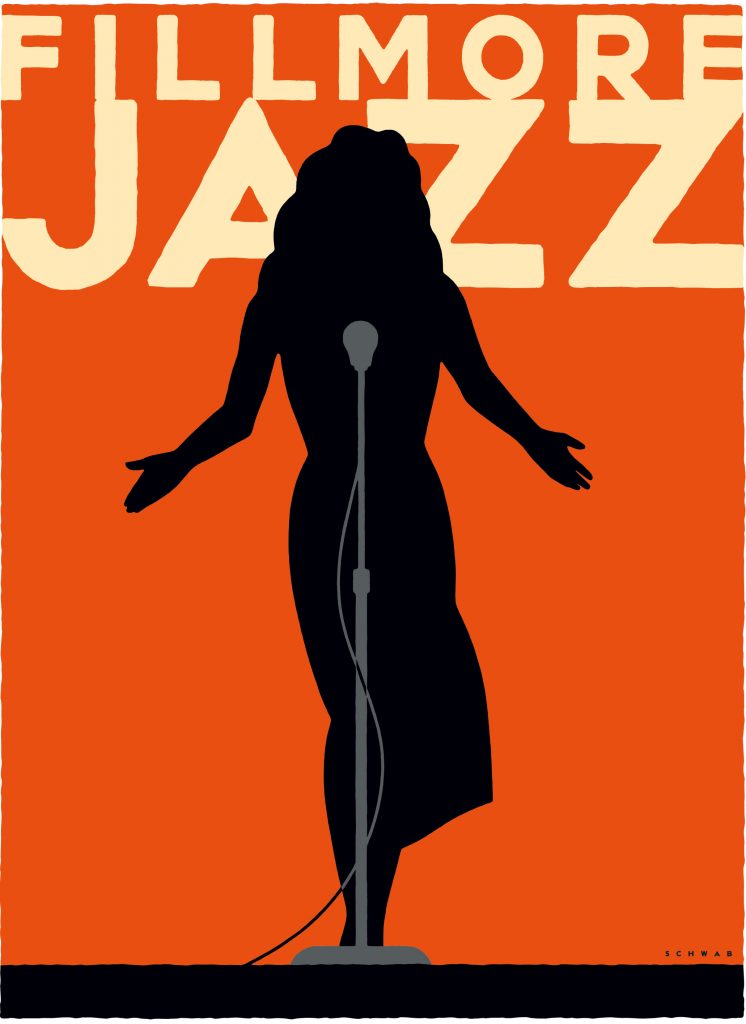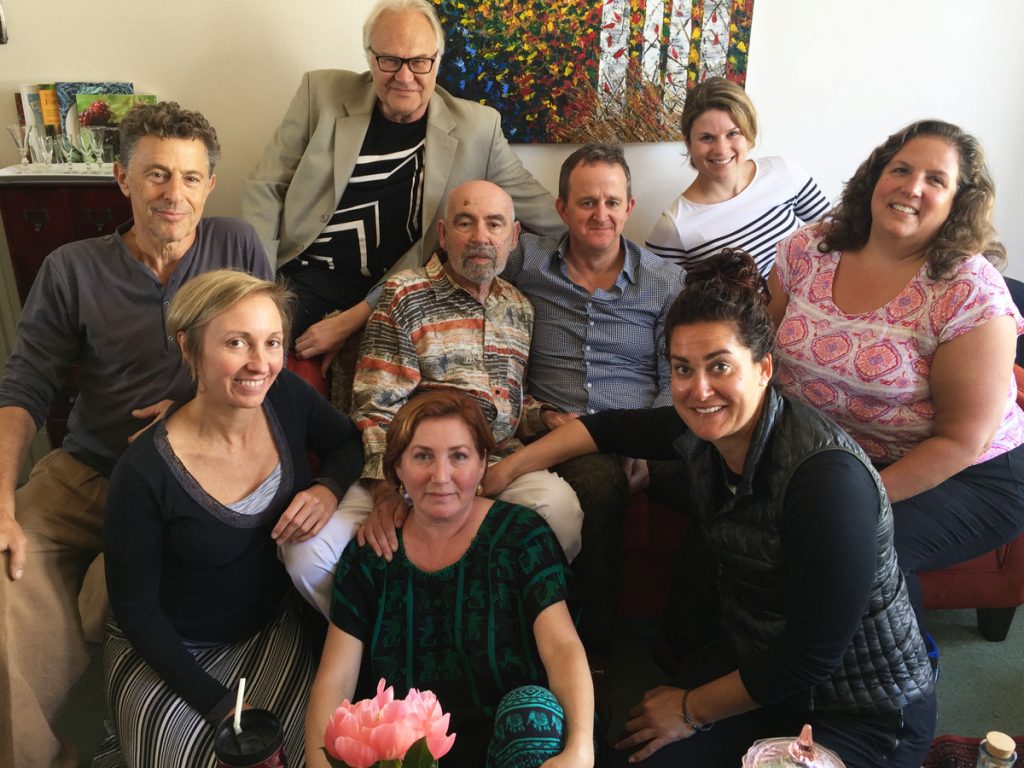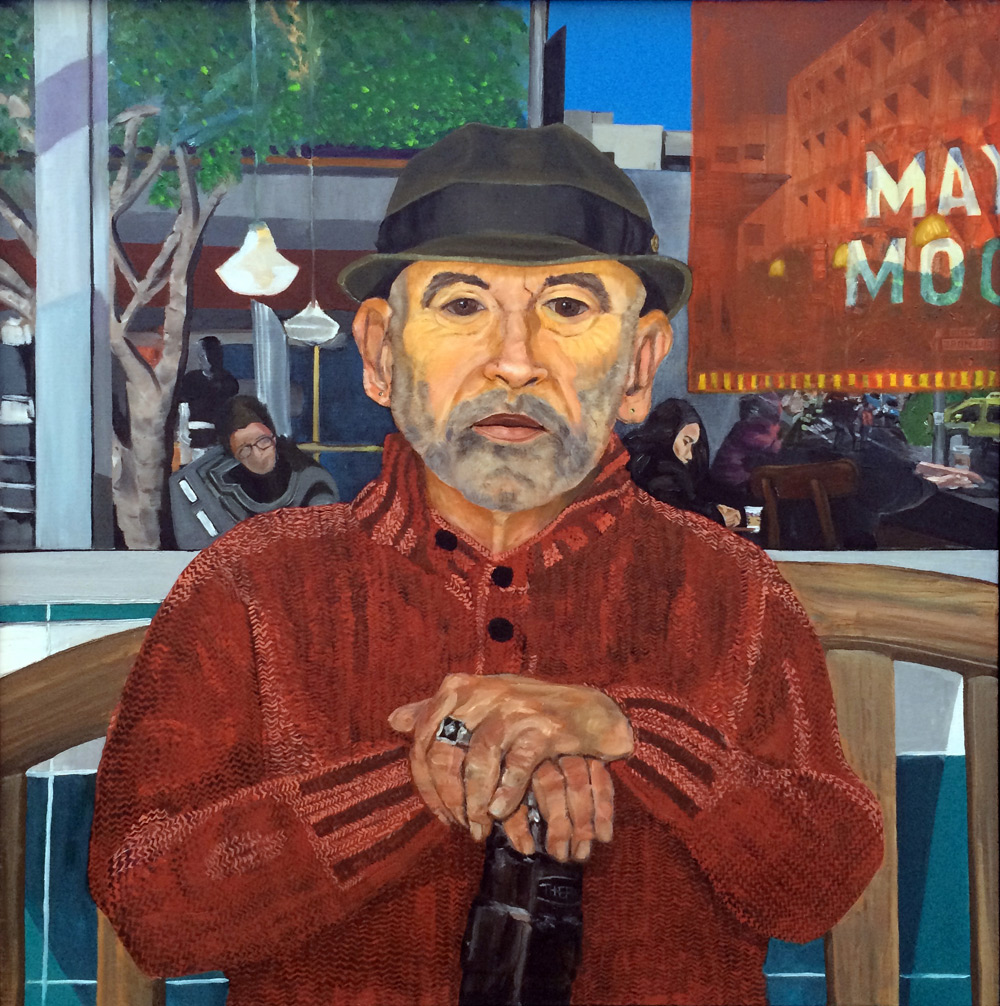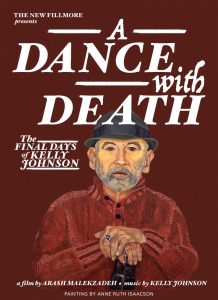By ARASH MALEKZADEH
A month ago, I was offered the opportunity to film the last days of Kelly Johnson’s life. I did not know him. I did not know how or why his death was predetermined.
I was told to meet the next morning at Peet’s for coffee. Then I’d walk half a block with my equipment to a beautiful blue Victorian overlooking Fillmore Street where he’d lived since 1969. After climbing two flights of stairs, each step creaking with antiquity, I entered the top flat. I followed an oxygen tube strewn across the carpet.
Kelly Johnson sat on his red couch, calmly staring out the window, as I approached with my camera in hand. A smile stretched across his face as he greeted me. He was ready for his close up.
I met Kelly only during the last two weeks of his life, but came to feel as if I had known him longer than I’ve been alive. His spirit was unrestrained. But his body was incapacitated, tethered to his oxygen concentrator and restricted to a walker and, at the end, a wheelchair.
“My body has given out,” he said. “You take away my medication, my oxygen, and I’ll be dead by sundown.”
♦
At 75 years old, Kelly was terminally ill with pulmonary disease, his breathing labored, his body racked with arthritis. After several years of declining health, barely able to leave his apartment, he began planning his death. On May 7, Kelly Johnson died after invoking California’s new aid-in-dying law — a memory I cannot erase.
California’s End of Life Option Act went into effect on June 9, 2016, allowing terminally ill adults to be prescribed aid-in-dying medication under certain conditions. Patients must have the capacity to make medical decisions for themselves and self-administer the drug, either by eating, drinking or swallowing it. Pharmacies and physicians can opt out at any point.
Kelly came to his decision on the way to Peet’s, a community hub on the corner of Fillmore and Sacramento. He was a regular there, having spent countless mornings and afternoons cultivating friendships over cups of coffee and conversation.
“I reached a point where people were coming and dragging me down to Peet’s, and I was just gasping for breath,” Kelly said. “There was nothing left of me.” He realized his patronage at Peet’s would soon come to a halt. “I got about three or four steps from my house and I just wanted to die,” he said. “I wanted it to be over.”
As a child, Kelly performed with his sister on the vaudeville circuit as a contortionist and tap dancer. When he moved to California as an adult in the late 1960s, he and his wife started the San Francisco Dance Theater on Fillmore Street — and changed the face of Bay Area dance in the decades that followed.
In the 1980s, he shifted his focus after becoming executive director of the Berkeley Symphony, working alongside international greats like conductor Kent Nagano, until his diminishing health pushed him toward retirement. In the final stretch of his career, he got to do what he had always wanted: He became a concert pianist, embarking on a tour of retirement communities in Northern California, playing classical piano concerts and composing original music of his own. Earlier this year he issued a final CD of ballet music he wrote and performed.
“I’ve managed to produce something that I’ve loved until the very end,” he said.
Kelly Johnson was an entertainer at heart. He’d arranged countless performances throughout his life and was determined to orchestrate his own death — the grand finale.
♦
“I look back at my life and I’ve choreographed an extraordinary dance,” he said. “It’s over. Strike a pose! Bring the curtain down!”
As I documented his final weeks, I witnessed a person truly coming to peace with the end of his life. Kelly spent his evenings in the intimate company of his friends, listening to private performances from various musical guests. The sounds of the piano and B3 organ, vocal melodies and clinking glasses floated through his living room window out into the night air.
“I’m in my home, I’ve got live music, I’ve got a lot of people,” he said. “I can go to a nursing home and I’d have a chest at the end of my bed with all my belongings in it, with someone who’s prolonging my life in misery. But you don’t have to have a black period in your life. I don’t, and I’m very fortunate.”
At first, I felt intrusive — following his final moments with a camera, recording private conversations and interactions. Yet Kelly didn’t mind. He wanted the world to hear his story and to know about the end-of-life option.
Kelly acknowledged that he could let his life naturally take its course, or take his chances by quitting the medication that was keeping him alive. But he was determined to choreograph exactly how he would leave the world.
“I’m happy he can go the way he wants to,” said Leda Meredith, his daughter. “And what the rest of us have to deal with as far as grieving after the fact is not his problem.”
On his last day, seven hours before his death, I followed Kelly on his final trip down to Peet’s. He was surrounded by his eclectic community of longtime companions and neighborhood friends, all eager to say their final goodbyes. On the wall was a newly hung portrait of him. He read from a brass plaque attached to the place where he often sat, engraved with the words “Kelly’s Corner.”
“In loving remembrance of Kelly Johnson, Mayor of Peet’s and friend to all,” he read aloud before the emotional crowd erupted in applause. After an hour of goodbyes, he retreated back to his home to prepare to die.
I set up my tripod next to his baby grand piano. My lens peeked around the corner of the archway leading into his living room. I knew what to expect, although I couldn’t say I was ready. But Kelly was.
♦
He took his anti-nausea medication in preparation for the aid-in-dying drug. He sat with his daughter on his left and his best friend and downstairs neighbor on his right. He drank a rare tequila from India as he listened to a recording of himself playing Scriabin’s 24 Preludes, Opus 11. His hands jolted as his muscle memory played along.
“They’re not perfect but I love those pieces,” he said. “If anything musically is me, it’s those pieces.”
After the 40-minute composition ended, he was handed the aid-in-dying medication — 90 capsules of powder mixed with orange juice. He had two minutes before the concoction turned to sludge.
“I think now my brain is telling me it’ll fade away peacefully and leave me with my friends,” Kelly said. “That’s my everlasting life. And I’m very happy, just very happy.”
On his cue, the room filled with his most recent recording, Chopin’s Nocturne 21 B. With no hesitation, he quickly sipped the cocktail through an oversized straw. As the music fluttered through the speakers, his eyes settled shut in the embrace of his most beloved.
EARLIER: “Kelly’s Corner“
Filed under: Body & Soul, Locals, Video






